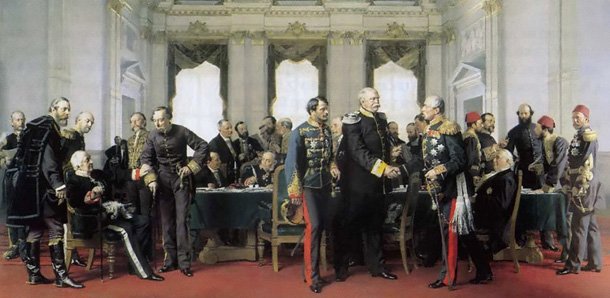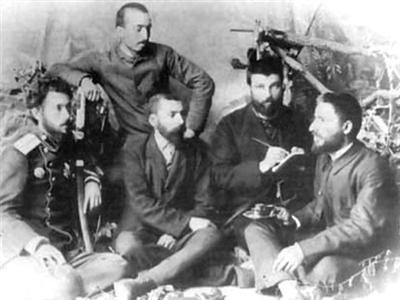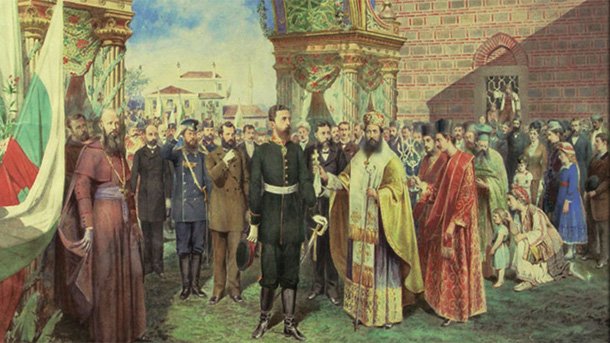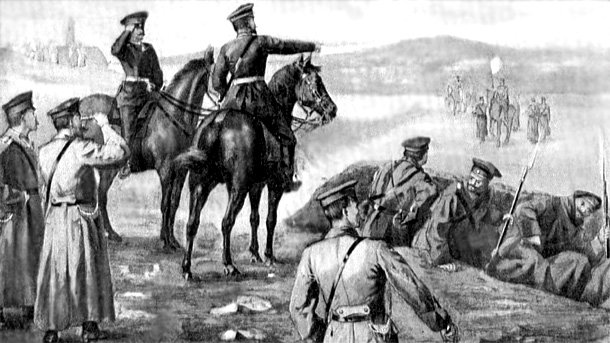The Unification of North and South Bulgaria that took place on 6 September 1885 is one of the most remarkable events in the history of modern Bulgaria. It was a successful step in the implementation of the national program of unifying Bulgarians that came as a continuation of Bulgaria’s national revolution. Only seven years after the liberation from Ottoman rule in 1878, Bulgarians on both sides of the Balkan Range dared violate the Treaty of Berlin of the Great Powers and with admirable unity and patriotism rarely seen in history show political maturity and willingness for free development.
Founded in the 7th century, the Bulgarian state has a long historical tradition. But because of five centuries of Ottoman domination in Bulgarian lands, the process of forming the Bulgarian nation ended basically in the 1870s. This process involves economic advancement, the creation of a unique national culture based on a single language, the struggle for an independent church and state, the promotion of a national identity and the awareness of belonging to a community. The historical and geographical boundaries of the Bulgarian nation that emerged naturally covered the lands of Northern Bulgaria from the Black Sea to Nis, of Thrace to the Aegean coast, of Macedonia to Ohrid, Debar and Struga. As a result of the National Liberation struggle, the heroic and sacrificial April Uprising of 1876 and the subsequent Russo-Turkish War of 1877-1878, Bulgaria was finally liberated. And with the peace treaty signed on 3 March 1878 at San Stefano near Istanbul, Bulgaria’s statehood was restored within approximately the same territorial limits.

© Photo: archive
However, led by their political interests and selfish ends, the Great Powers did not accept the borders outlined in the San Stefano treaty. At the Congress of Berlin in July 1878, crucial decisions for the future of the Bulgarian people and the Balkans were taken. According to the Berlin Treaty, the Bulgarian nation was fragmented territorially into five parts: the free (albeit vassal to the Sultan) Principality of Bulgaria was assigned the lands of Northern Bulgaria with the Sofia district. The territory of Southern Bulgaria, named Eastern Rumelia, was given the status of a Turkish province with administrative autonomy. Macedonia and the part of Eastern Thrace liberated in the Russo-Turkish War of 1877-1878 were returned to the Ottoman Empire. The Kingdom of Serbia was given the territories around Pirot, Nis and Vranje and the region of North Dobrogea was given to the Kingdom of Romania.
The Treaty of Berlin was signed by statesmen from England, France, Germany, Austria-Hungary, Italy, Russia and the Ottoman Empire. It ignores the natural right of every nation to self-identity and raises the issue of total liberation and unification of all Bulgarians in a single, national, and free country. To solve this issue, the Bulgarian people launched into decades of struggles whose path will be remembered with the Kresna-Razlog Uprising (1878), the revolutionary campaigns of the Internal Macedonian Odrin Revolutionary Organization (VMORO), the glorious Ilinden Uprising (1903), wars of national liberation and unification (1912-1913). The nationwide effort to achieve the national ideal yielded its first success with the Unification of Eastern Rumelia with the Principality of Bulgaria in 1885.
Although the Treaty of Berlin put Eastern Rumelia in the most favorable position compared to all other non-liberated lands, the Unification movement there that started in 1878 was not quenched. In the nationwide yearning for achieving Bulgaria’s national ideal, initiatives were sometimes taken up either by the governments of Bulgaria (1880), or by the ruling authorities of the area (1884). The Unification was a major item on the platforms of all political parties, the main topic of the press and the reason for the patriotic action of refugee and other societies.

© Photo: archive
On 10 February 1885, a secret revolutionary committee was set up in Plovdiv, chaired by the famous author of Notes on the Bulgarian Uprisings, publicist and apostle of the April Uprising Zahariy Stoyanov. The original purpose of the committee was a struggle for the liberation of Macedonia and for "the unification of the entire Bulgarian nation split by the Berlin Congress into five parts." Several months later, based on a realistic analysis of the unfavorable international situation and its own abilities, the Bulgarian Secret Central Revolutionary Committee restricted its activities to the preparation of the Unification of South and North Bulgaria under the scepter of Knyaz Alexander of Battenberg.
The Bulgarian Secret Central Revolutionary Committee undertook large-scale organizational work. On 28 May 1885, it printed the first issue of Zahariy Stoyanov’s newspaper “Struggle” (original Bulgarian title Borba) - a small newspaper with a huge and clear objective - to promote and justify the need for Unification. And this newspaper really turned into the banner of the struggle.
On 6 September 1885, the Bulgarian Secret Central Revolutionary Committee in Plovdiv, with the support of the army and the public, proclaimed the Unification of Eastern Rumelia with the Principality of Bulgaria. The chief governor Gavril Krastevich was ousted as a sign that the province was no longer under the rule of the Ottoman Empire. On September 8, with a special proclamation, Prince Alexander of Battenberg recognized the Unification and "accepted that from now on he would be named Prince of North and South Bulgaria.

© Photo: muzeini-relikvi.net
Approved unconditionally by all Bulgarians, the Unification directly affected the interests of Turkey and drastically violated the Treaty of Berlin, which meant that its recognition was to depend on the approval of the Great Powers. European nations condemned this independent Bulgarian act and no country announced its strong support. Most unsatisfied was Russia, because the Unification was declared without its prior knowledge and consent. Russia’s negative position trigged an opposite response in England, which found in this an opportunity to shake the Russian presence in Bulgaria. European governments decided that the Bulgarian question should be considered at an ambassadorial conference in Istanbul.
In the months of September-October 1885, the Government of Petko Karavelov developed diverse activities to strengthen the unification process. However, they were unable to prevent the war that Serbia, firmly opposed to the Unification, declared on Bulgaria. On 2 November 1885, the Serbian army under the supreme command of King Milan treacherously invaded Bulgaria. The same day, with a special manifesto, Prince Alexander I Battenberg called on all Bulgarians to rise and defend “their homeland and freedom." The Serbian offensive lasted only five days - as many as were needed by the Bulgarian troops to withdraw from South Bulgaria and arrive on the Western Front. The decisive day of the war was November 7, 1885 at Slivnitza where the Bulgarian troops defeated the Serbian divisions. The following week the Bulgarian army went on the offensive all along the military front. Serbia was forced to admit defeat and sign a peace treaty with Bulgaria.

© Photo: archive
The victory of the Bulgarians in the first Patriotic War won the respect and admiration of the European public and made it impossible to split again North and South Bulgaria. On 24 March 1886, the ambassadors of the Great Powers at Constantinople signed in the Tophane palace an act by which the governance of Eastern Rumelia was entrusted to the Bulgarian Prince. Recognized internationally in this conditional form, but actually turned into reality, the Unification had long-term positive implications for the future political, economic and cultural progress of Bulgaria. For contemporaries, it gives an invaluable example of the victory of a cause defended patiently, carried out independently, and mainly – through the combined forces of ordinary people, politicians and the military.
English version: Rossitsa Petcova
On January 6, the Bulgarian Orthodox Church is marking Epiphany. According to the Bible, on this day John the Baptist baptized Jesus Christ in the Jordan River. Traditionally, a festive Epiphany liturgy is held in churches, water is blessed, and then..
The fighting for Sofia within the framework of the Russo-Turkish War (1877-1878) began on December 25, 1877. On January 3, 1878, the city's commandant Osman Nuri Pasha began to withdraw from Sofia. His plans to set the city on fire were thwarted..
In its latest digital section “Buildings Tell a Story”, the Regional History Museum – Sofia presents the stories of iconic buildings in the center of the Bulgarian capital city, as well as of the people who once lived in them. The video initiative..
Almost 40 years ago, Bulgarian Orthodox Church communities were established in Western and Central Europe in several cities - Budapest, Munich, Vienna,..

+359 2 9336 661
